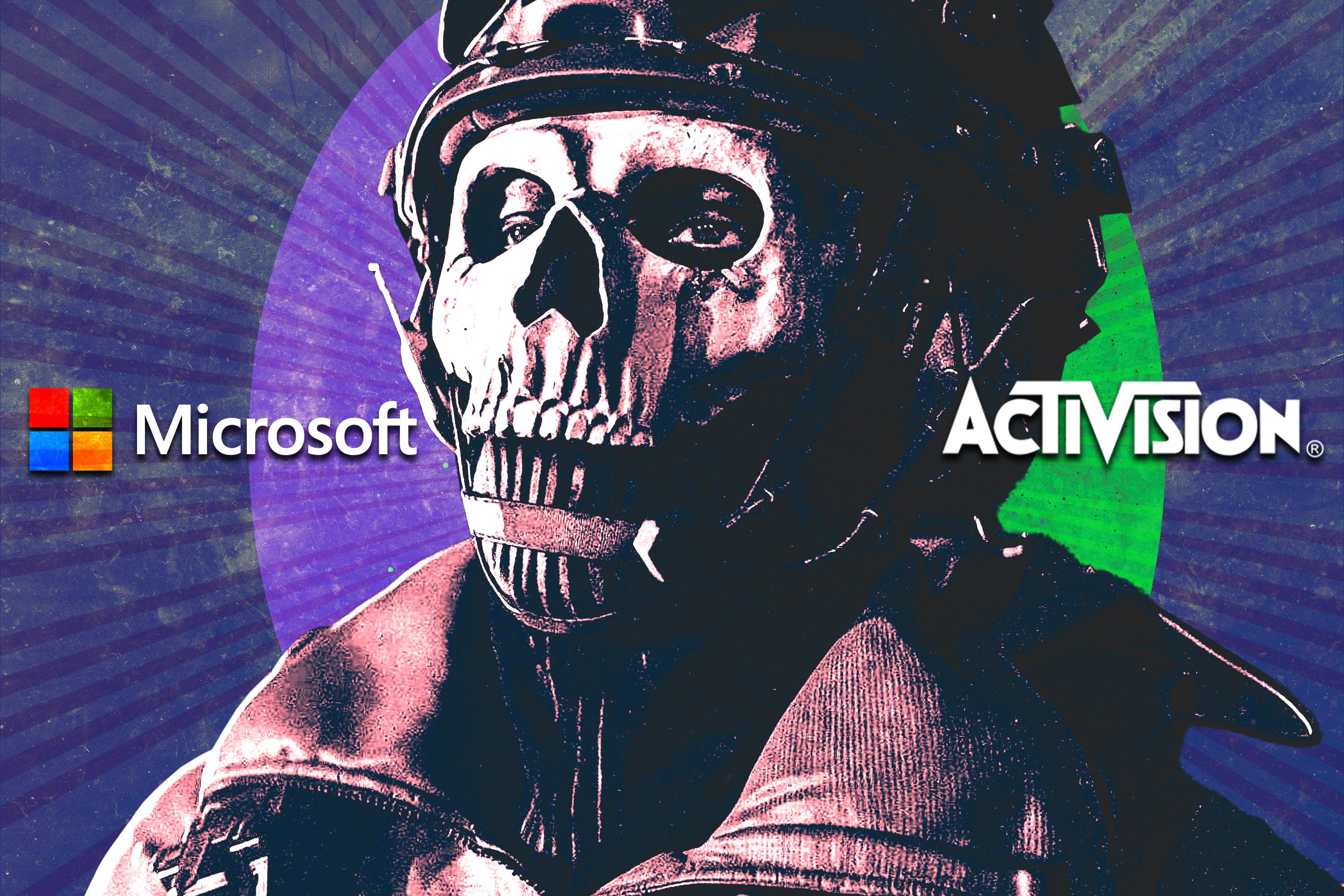Microsoft’s Billion-Dollar ‘Call of Duty’ Problem
Microsoft’s $69 billion takeover of Activision Blizzard seemed inevitable. Now government regulators around the world are trying to block the deal over … ‘Call of Duty’?
It’s hard to overstate the industry-wide shock at the announcement 13 months ago that Microsoft would buy Activision Blizzard. The latter publishes Call of Duty, the world’s bestselling first-person shooter franchise, so the deal was seen as a great coup for Microsoft’s Xbox and a grave threat to Sony’s PlayStation—if Microsoft ever decided to make the game exclusive. But more than that, the $69 billion agreement was framed as a significant disruption to the video game business and a massive bet on the future of the metaverse. A year earlier, Microsoft bought the video game holding company ZeniMax Media, responsible for titles like Fallout and The Elder Scrolls Online, for $7.5 billion, a breathtaking price tag at the time. This latest acquisition would outvalue that transaction nearly tenfold, but suddenly, the deal seems to be falling apart. What happened?
First, some context: After lagging behind Sony and the PlayStation for nearly a decade, Microsoft needed a triumph in the console market. Historically, PlayStation always beats Xbox in hardware sales, largely on the strength of its exclusive releases, while Microsoft decisively beats Sony’s PlayStation Plus in subscribers and revenue with its own monthly games subscription platform, Game Pass. Sony, for its part, earned its advantage over Microsoft in terms of exclusives by negotiating terms with third-party developers, such as Square Enix and Kojima Productions, but also by outright acquiring developers, such as Naughty Dog, to produce games unique to the PlayStation, such as The Last of Us.
In a sense, Microsoft is simply fighting fire with fire, buying a big company with a proven portfolio of popular games in order to bolster the value proposition of the Xbox and Game Pass. The earliest backlash to the deal was less about antitrust concerns—related to Microsoft potentially making Call of Duty and other popular titles exclusive—and more about the mismanagement of Activision under its outgoing CEO, Bobby Kotick, now destined to exit the company with a golden parachute worth more than $500 million. The antitrust concerns were palpable in progressive corners. But realistically? This thing seemed inevitable. Sony was fucked.
Until it wasn’t! In December, the Federal Trade Commission sued to block the deal, mostly basing its argument on—you guessed it—antitrust concerns. More recently, the European Union and the U.K. threatened to block the deal on similar grounds. To summarize the 23-page complaint from the FTC: Sony and Microsoft already control the market for “high-performance video game consoles,” and Microsoft controlling Activision would only further consolidate the console market and thus further restrict consumer choice. “Activision’s content is extremely important for, and drives adoption of, video game consoles,” the FTC says in its complaint, which names a few pivotal titles but also specifies its multibillion-dollar sticking point, Call of Duty.
The latest entry, Modern Warfare II, was released in October and exceeded $1 billion in sales in its first 10 days on the market. It’s the fastest-selling game in the franchise to date, but it’s also the latest entry to vastly outsell every other game, in any genre, sharing its release window. Call of Duty dominates the market so consistently that even the other big-budget, year-winning hits, such as Elden Ring or Horizon Forbidden West, don’t really compare. Call of Duty prints money, forever. It has launched a new, full-price title almost every year since 2003, and those titles each represent a new platform for microtransactions—worth billions upon billions of dollars—beyond the initial $60 sale. Call of Duty only gets bigger and more crucial to the future of video games.
So you can see why Microsoft would want to buy Activision and turn the company into an exclusive or at least semi-exclusive publisher for the Xbox, even if Microsoft insists it won’t do that. And you can see why Sony might fear a competitive disadvantage in this state of affairs. PlayStation may be the bigger platform, but Xbox is backed by Microsoft, a $2 trillion company willing to outspend the net worth of Sony.
You might wonder why so much of the commentary about this deal, including this piece, doesn’t concern itself with the third (and by far oldest) major player in the console market, Nintendo. Indeed, in the FTC’s complaint, the agency distinguishes the sort of hardware sold by Sony and Microsoft (“high-performance video game consoles”) from the sort of hardware sold by Nintendo (“lower computational performance,” “necessarily sacrifices computing power”). The distinction is seemingly arbitrary but functionally important to evaluating the antitrust issues in this case; the “relevant market” isn’t video games or video game consoles but specifically “high-performance video game consoles,” in addition to gaming subscription services.
Simply put, Nintendo is a subpar platform for online multiplayer gaming. Since the Wii, Nintendo has opted to produce lightweight consoles optimized for handheld usage, largely unsuitable for competitive or even casual online play. Nevertheless, Microsoft Gaming CEO Phil Spencer says Microsoft will in fact bring Call of Duty to the Switch—for the first time ever—in a 10-year agreement with Nintendo. It’s a sign of Spencer’s desperation to prove that Microsoft isn’t planning to lock its competitors out of Call of Duty.
This raises some obvious questions, which are often unanswered or, worse, unstated in critical coverage of the deal. Why shouldn’t Microsoft lock Sony and Nintendo out of Call of Duty? Why doesn’t Microsoft simply defend the strategic rationale for taking such a measure? Why do gamers have some inviolable right to play Call of Duty on a PlayStation when they don’t have any comparable right to play Final Fantasy XIV on an Xbox? Why would Microsoft spend $69 billion to buy a video game publisher only to play nice with its main rival in the console market? What is Microsoft supposed to do to compete fair and square?
The answers aren’t so much about Microsoft, or about Microsoft versus Sony versus Nintendo, so much as they are about the financialization of gaming in a more universal sense. Video game publishers have spent the past decade or so engineering new ways to charge gamers for gaming. These innovations on consoles and mobile platforms have, at times, irritated consumers and, at worst, exploited the most vulnerable gamers of all: children. That’s the political basis for this unprecedented level of scrutiny involving a big buyout in the video game industry. This deal might’ve cruised through approvals as recently as five years ago, but now it faces potentially insurmountable objections from regulators around the world. Maybe it has to be this way. If the antitrust police won’t prevent Microsoft from buying every major video game company that isn’t already owned by Sony, then what would they prevent?
In its complaint, the FTC depicts a console market stunted by anticompetitive dynamics, making the industry vulnerable to rapid consolidation by Microsoft. The idea isn’t that tougher antitrust scrutiny in the past would’ve produced a perfectly competitive console market filled with a dozen publishers hawking hardware at half the current price of an Xbox Series X. Rather, the idea is that the console wars would ideally be defined by publishers competing to produce the best specs and the best features for the best price and winning consumers that way—instead of subsuming every other video game studio under exclusivity agreements and leaving fans with no choice.
Microsoft can promise to keep Call of Duty open to Sony and Nintendo, for the next 10 years or even indefinitely, but Microsoft can’t promise to keep everything at Activision open to everyone—that would deny the obvious commercial logic of the transaction! So here we are, watching regulators in three different time zones rushing to unwind the deal that once promised (threatened?) to upend the video game industry, potentially sending Xbox’s Spencer, Activision’s Kotick, and the rest of us back to the title screen.


